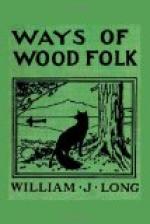When the sun shines hot in August, he finds you lying under the alders, with the lake breeze in your face, and he opens his eyes very wide and says: “Tsic a dee-e-e? I saw you last winter. Those were hard times. But it’s good to be here now.” And when the rain pours down, and the woods are drenched, and camp life seems beastly altogether, he appears suddenly with greeting cheery as the sunshine. “Tsic a de-e-e-e? Don’t you remember yesterday? It rains, to be sure, but the insects are plenty, and to-morrow the sun will shine.” His cheerfulness is contagious. Your thoughts are better than before he came.
Really, he is a wonderful little fellow; there is no end to the good he does. Again and again I have seen a man grow better tempered or more cheerful, without knowing why he did so, just because Chickadee stopped a moment to be cheery and sociable. I remember once when a party of four made camp after a driving rain-storm. Everybody was wet; everything soaking. The lazy man had upset a canoe, and all the dry clothes and blankets had just been fished out of the river. Now the lazy man stood before the fire, looking after his own comfort. The other three worked like beavers, making camp. They were in ill humor, cold, wet, hungry, irritated. They said nothing.
A flock of chickadees came down with sunny greetings, fearless, trustful, never obtrusive. They looked innocently into human faces and pretended that they did not see the irritation there. “Tsic a dee. I wish I could help. Perhaps I can. Tic a dee-e-e?”—with that gentle, sweetly insinuating up slide at the end. Somebody spoke, for the first time in half an hour, and it wasn’t a growl. Presently somebody whistled—a wee little whistle; but the tide had turned. Then somebody laughed. “’Pon my word,” he said, hanging up his wet clothes, “I believe those chickadees make me feel good-natured. Seem kind of cheery, you know, and the crowd needed it.”
And Chickadee, picking up his cracker crumbs, did not act at all as if he had done most to make camp comfortable.
There is another way in which he helps, a more material way. Millions of destructive insects live and multiply in the buds and tender bark of trees. Other birds never see them, but Chickadee and his relations leave never a twig unexplored. His bright eyes find the tiny eggs hidden under the buds; his keen ears hear the larvae feeding under the bark, and a blow of his little bill uncovers them in their mischief-making. His services of this kind are enormous, though rarely acknowledged.
Chickadee’s nest is always neat and comfortable and interesting, just like himself. It is a rare treat to find it. He selects an old knot-hole, generally on the sheltered side of a dry limb, and digs out the rotten wood, making a deep and sometimes winding tunnel downward. In the dry wood at the bottom he makes a little round pocket and lines it with the very softest material. When one finds such a nest, with five or six white eggs delicately touched with pink lying at the bottom, and a pair of chickadees gliding about, half fearful, half trustful, it is altogether such a beautiful little spot that I know hardly a boy who would be mean enough to disturb it.




